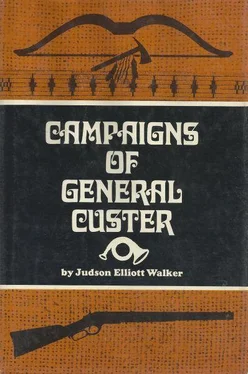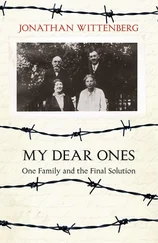Walker Array - Campaigns of General Custer in the North-west, and the final surrender of Sitting Bull
Здесь есть возможность читать онлайн «Walker Array - Campaigns of General Custer in the North-west, and the final surrender of Sitting Bull» весь текст электронной книги совершенно бесплатно (целиком полную версию без сокращений). В некоторых случаях можно слушать аудио, скачать через торрент в формате fb2 и присутствует краткое содержание. Жанр: Историческая проза, Исторические приключения, Приключения про индейцев, на английском языке. Описание произведения, (предисловие) а так же отзывы посетителей доступны на портале библиотеки ЛибКат.
- Название:Campaigns of General Custer in the North-west, and the final surrender of Sitting Bull
- Автор:
- Жанр:
- Год:неизвестен
- ISBN:нет данных
- Рейтинг книги:5 / 5. Голосов: 1
-
Избранное:Добавить в избранное
- Отзывы:
-
Ваша оценка:
- 100
- 1
- 2
- 3
- 4
- 5
Campaigns of General Custer in the North-west, and the final surrender of Sitting Bull: краткое содержание, описание и аннотация
Предлагаем к чтению аннотацию, описание, краткое содержание или предисловие (зависит от того, что написал сам автор книги «Campaigns of General Custer in the North-west, and the final surrender of Sitting Bull»). Если вы не нашли необходимую информацию о книге — напишите в комментариях, мы постараемся отыскать её.
Campaigns of General Custer in the North-west, and the final surrender of Sitting Bull — читать онлайн бесплатно полную книгу (весь текст) целиком
Ниже представлен текст книги, разбитый по страницам. Система сохранения места последней прочитанной страницы, позволяет с удобством читать онлайн бесплатно книгу «Campaigns of General Custer in the North-west, and the final surrender of Sitting Bull», без необходимости каждый раз заново искать на чём Вы остановились. Поставьте закладку, и сможете в любой момент перейти на страницу, на которой закончили чтение.
Интервал:
Закладка:
Custer's plan of attack in Indian warfare, in which he had been hitherto pre-eminently successful, was that of simultaneous assault from several points, an attack in front and flank at all events. In this instance, when arrived near the battle-field, and as he prepared himself to lead the charge about 12.30 P: M., he ordered the remaining two divisions to move up quickly and support him.
The battalion under Benteen with the pack train did not come up in time to participate in the charge and opening fight.
The detachment under Major Reno, numbering 145 men, hurried forward as ordered, and crpssed the river, where they soon became engaged with overwhelming numbers of the enemy. To save themselves from utter annihilation at the hands of the countless droves of Indians, who suddenly sprang into view, they retreated to a high hill in the vicinity, where they entrenched themselves, being soon after joined by the troops under Benteen.
Soon afterward they were furiously attacked and besieged by numberless foes; the siege being next day renewed, when the troops were relieved by the arrival of the- soldiers under General Terry, the Indians filing away across the hills at his approach.
Up to this date nothing was known of the fate of Custer and his command, the soldiers in the entrenchment on the hill, who never before had known him to fail them in danger, wondering audibly why he did not come to their relief.. In the retreat from the scene of his engagement with the Indians to the safety of the hill, Major Eeno lost in killed : First Lieutenant Donald Mcintosh, Second Lieutenant Ben. H. Hodgeson, 7th Cavalry, and A. A. Surgeon J. M. DeWolf, together with the famous scout Charles Reynolds, and 29. enlisted men of the regiment killed and 7 wounded. In the later attack on the hill, of the combined forces of Reno and Benteen-380 men in all, with 12 officers-there were killed 18 enlisted men and 46 wounded.
Upon the arrival of General Terry, the first intimatjjon was obtained of the fate of Custer and his men. An Upsar-oka scout, named Curley, had almost miraculously escaped during the progress of the fight with Custer, and made his way back to General Terry, then on the steamer " Fat West," at the mouth of the Big Horn River, and reported the total loss of Custer and his soldiers.
This report was disbelieved, or, at least, thought to be
greatly exaggerated-it being deemed impossible that such a calamity could befall the most successful Indian fighter of his day. Yet, from the extreme agitation of the forlorn scout, it was evident that a misfortune of some kind had occurred; and General Terry, with the residue of the troops under him, at once pressed forward, under the leadership of Cur-ley, arriving in time to save the lives of the wearied survivors under Reno; who, though making a gallant defense against overpowering numbers of the enemy, had lost all hope of rescue, since Custer had apparently failed them, and greeted the unexpected arrival of their comrades as a happy reprieve from expected death.
Immediately upon the arrival of General Terry-the Indians then having left-a detachment was sent out to search for traces of the missing commander and his men. Not far away their battle-field was found, and though no living thing was there to tell how grandly they had fought, and nobly they had died, yet no tongue was needed to show that they had all gone down, company by company, contending to the last for life, as heroes ever do. Their dead and mutilated bodies, disposed in the orderly array of systematic battle; the compact companies, with officers in place behind them ; the unbroken skirmish line of ghastly corpses, testified more eloquently than spoken words could do to the sublimity of courage that had animated each soul of that heroic band. An examination of the battle-ground disclosed the fact that when Custer left his comrades of the other two divisions, with orders for them to hasten forward and join in the attack, he dashed down the stream soma distance, seeking a convenient ford where he could cros^the river and attack the village from below; but failing to do so, went much further down the river than intended in his arrangements with Reno, whom he expected to support in the charge he had ordered Eeno to make before leaving him. When, at length, a suitable ford was discovered, his further progress was violently opposed by numberless Indians, who poured in a heavy fire from across the narrow river. Custer dismounted, to fight on foot, but his skirmishers were unable to cross the stream under the galling fire that assailed them and the cavalry were speedily driven back to the high ground in the rear; but not until swarms of Indians, mounted and on foot, had poured over the shallow river, and seized the ravines on either side, effectually cutting off their retreat in the direction in which they came. Custer was soon effectually surrounded, and receiving a terrible fire from all sides. The dead bodies of men and horses were found at the ford, and at a distance of about three-quarters of a mile from the river, as though thrown across the line of retreat to check the advance of the enemy. The entire company of Captain James Calhoun, brother-in-law of Lieutenant-Colonel Custer, lay dead in an irregular line, with Captain Calhoun and his Lieutenant, John J. Crittenden, in their proper places in the rear. A mile beyond this, on a ridge parallel to the river, the whole of Captain Myles W. Keogh's company were slaughtered in position – their right resting on the hill where Custer fell. Still further back on the ridge were found the dead bodies of thirty-two men of Captain George W. Yates' company, and here, too, had fallen the brave and ill-fated Custer, with his brother, Captain T. W. Custer, his Adjutant, Captain W. W. Cook, Lieutenant William Van W. Beily, and Captain Yates, together with the young nephew and brother of Custer-Armstrong Beed and Boston Custer, forage-master of the 7th Cavalry.
In a ravine near the river were found the dead bodies of the men and horses of Captain Thomas W. Custer's company, together with those of Captain Algernon E. Smith, and twenty-three men of his company. Lieutenant James E. Porter^Jjieutenant John Sturgis, and Lieutenant Harrington, together with tlllrty-five enlisted men, were missing, and no trace of them could be discovered. Near the ford, as though killed early in the fight, was the body of Mark Kel-log, correspondent of the New York Herald, and a resident of the frontier. His body was undisturbed and still clothed, as though overlooked by accident in the horrible carnival of blood and butchery that followed hard upon the battle. Near here was also found the body of " Isaiah" a colored scout, long in the employ of the officers on the frontier, an intelligent, trustworthy man, married to a Sioux squaw, who, with his children, was then at Fort Rice. This circumstance did not appear to be a recommendation to the mercy of his wife's relatives, as he was not only killed, but circumstances indicated that he had been captured and met his death by the savage cruelty of torture.
The probable fate of the thirty-five missing men and their three officers is too horrible to contemplate without a shudder. It is claimed by Indians who were in the fight and afterwards returned to their agencies, that the horses of a portion of the calvary were captured by the Indians early in the engagement, while the situation of those surrounding the group of men and officers, with whom Custer made his last stand, would seem to indicate that they had been killed by the soldiers to form a barricade, behind which to defend themselves, until the relief which they doubtless then expected from Reno and Benteen should arrive.
How vague and satisfactory are these pitiful details of this most horrible of modern massacres, the exact occurrences of which will probably never ba known! The sole survivors of all that proud array of men and steeds, so recklessly hurried to their impending doom, are the Upsaroka scout, "Curley," and the horse of Captain Keogh, Comanche, which was found near the battle-field with seven wounds. Major Reno, thinking him mortally wounded, ordered the noted war-horse to be shot; but Comanche was a veteran of the 7th Cavalry, and the men who knew and loved him, begged for his life, and by careful treatment and nursing he was restored, and remains to-day the only living survivor of the fated five companies who plunged into the carnage that engulfed alike, rider and steed, in the lonely valley of the Little Big Horn.
Читать дальшеИнтервал:
Закладка:
Похожие книги на «Campaigns of General Custer in the North-west, and the final surrender of Sitting Bull»
Представляем Вашему вниманию похожие книги на «Campaigns of General Custer in the North-west, and the final surrender of Sitting Bull» списком для выбора. Мы отобрали схожую по названию и смыслу литературу в надежде предоставить читателям больше вариантов отыскать новые, интересные, ещё непрочитанные произведения.
Обсуждение, отзывы о книге «Campaigns of General Custer in the North-west, and the final surrender of Sitting Bull» и просто собственные мнения читателей. Оставьте ваши комментарии, напишите, что Вы думаете о произведении, его смысле или главных героях. Укажите что конкретно понравилось, а что нет, и почему Вы так считаете.












